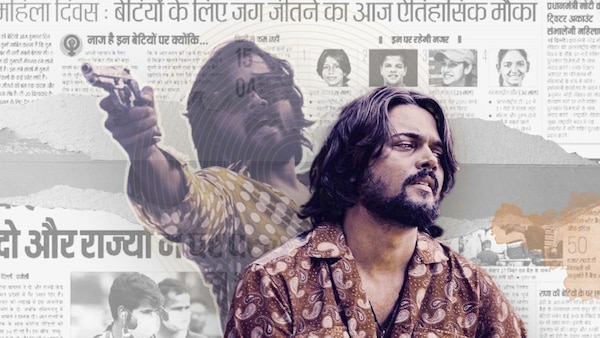As Online Stars Turn Onscreen Idols, What Bollywood Stands To Gain — & Lose
No longer the exception, the social media influencer is starting to become a regular sight in Hindi cinema.

Last Updated: 03.22 AM, Jan 15, 2023
In a scene from Disney+ Hotstar’s Taaza Khabar, the protagonist Vasant Gawade (played by internet celebrity Bhuvan Bam) ponders aloud: “Naseeb ki baarish hai, ya kismat mujh pe moot rahi hai?”
It’s probably as accurate a metaphor as any (albeit indelicate), for the increasing presence of social media starlets in our cinema — streaming and theatrical. With Taaza Khabar, Bhuvan Bam goes the furthest, fronting a noir underdog story about the predictable rise and fall of a street urchin via crime, greed, and some harsh lessons around morality. Produced by Bam’s own company, this is an ambitious project, aimed clearly to establish the YouTuber’s acting pedigree. Unsurprisingly, Bam doesn’t quite ace the litmus test that he has himself arranged. However, that is unlikely to prevent a worrying — at times self-defeating — trend from becoming regular, cynical practice.
Hindi cinema has regularly tried to borrow influence to compensate for its creative dryness. There was a time when cricketing stars were near regulars, with shoddy, awkward cameos from the likes of Ravindra Jadeja in Khel to veterans embarrassing themselves in Mujhse Shaadi Karogi. It’s hard to ascertain if there was ever a method to this vague madness. In the modern world, stats can possibly argue that there most certainly is. Social media stars come wrapped in giddy numbers, and the promise of that one thing that has eluded the Hindi film industry of late: a loyal fanbase.
No more the exception, the influencer is starting to become a regular sight in Hindi stories. YouTuber Prajakta Koli has now been part of a Dharma film, alongside the likes of Anil Kapoor and Varun Dhawan. And while her part in the Netflix series Mismatched is modestly notable, she has been found wanting alongside the tried and trained in Jugjugg Jeeyo. India’s most followed YouTuber, CarryMinati (Ajey Nagar), most recently had a rather churlish cameo in Ajay Devgn’s Runway 34. Kusha Kapila, to somewhat contrast these bit-parts, has continued to play a version of her internet persona in different Netflix projects – Masaba Masaba and the film Plan A Plan B, each of which underwhelm to an extent. In fact, something as patently within her comfort zone as the high-fashion world of Masaba Masaba, only exposes the frivolity of everything Kapila otherwise embodies to commendable impact in her 30-second videos. Possibly the only person who has made the leap seamlessly, with some promise, is Masaba Gupta herself — excellent in her show and in her short ‘I Love Thane’ from Modern Love Mumbai.
There is obviously macroeconomics at play here. As the Hindi audience becomes harder to figure, studio execs can be expected to pull at all kinds of levers to put people in the seats. Social media has become an undeniable force, to be reckoned with as an ally as opposed to a threat. But while integrations work as external mechanisms, within the world of the film they have been routinely underwhelming, often to the detriment of the storytelling. On some level, the numbers make sense, except they might do so at a cost to the actual craft. Bam, for example, has been around, snaking his way into rag-tag YouTube shorts and series, as part of the fluid creator economy that feeds off itself. He was part of a season of the popular TVF spoof Bachelors and discomfitingly, the one who stood out for the wrong reasons.
None of that has however prevented the moneyed Bam from chasing some sort of cinematic denouement. In Taaza Khabar, he plays a soft-centred lowlife, desperate to escape the cards he has been dealt. It’s a familiar story, punctuated by tropes that — despite a quirky premise — feel tiresome. Bam doesn’t do his version of Gawade, but amalgamates all the characters he has studied for the part. What is possibly most frustrating about the show is that a story that could so easily have lent itself to dark comedy, or lightweight chaos, broods senselessly just so it can pedestal Bam as an actor of both grimness and grief. It’s a self-centred idea of lethargic imagination, so blatantly trying to signal talent, it might as well have been titled ‘Curriculum Vitae’.
The emergence of stars in different streams and their interoperability is only for the better. More stars, more icons only translate to an expanding market for content, and the ability, as Bam has displayed to an extent, to champion art that might not make it through conventional pipelines. Tanmay Bhat, for all his flaws — and a horrifying film appearance of his own to boot — has in the past tried to promote and push other talents (Chintu ka Birthday was a result of AIB’s hunt for scriptwriters). The key here, however, would be to set aside the crown and think without the weight of the ego that manufactures legacy, where none exists. There is obviously skill to building patronage over the internet, but unlike actual cinema, the internet forgets and moves on. Roles, characters, stories and songs, good or bad, are history. They take doing, even the bad ones. Influencers don’t have to be good at everything. They clearly aren’t.
